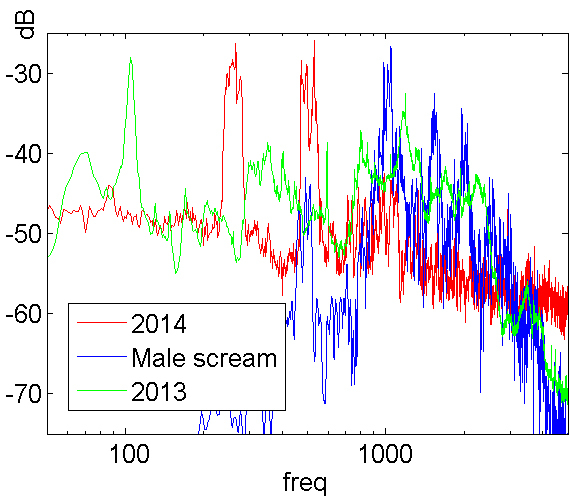For the 2014 Formula 1 season, there has been many changes to the design of the racing cars. A side effects of moving to more fuel efficient cars has been a radical change in the engine sound. There have been complaints about the quietness of the new engines, both from fans at the races and those watching at home. Now, Mercedes are proposing to try a noisier exhaust system during the weekend of the Spanish Grand Prix [1]. But will this solve the problem?
People complaining about the new car sound have focussed on the decibel count. The sport's governing body FIA have published figures to show that the sound pressure level near an F1 car has dropped by 11 decibels from 145 to 134 dB [2]. Even so, the 2014 engines are still incredibly noisy, producing sound levels likely to produce pain in the ear if you get too close[3]. While the new cars are undoubtedly quieter, there is more to how we perceive sound than loudness. If the problem was simply loudness, then fans could just follow the advice from F1 legend Niki Lauda,
If people don't like the new noise, take the earplugs out; the television people at home, turn the volume up. [4].
Last year's engines produced a lot of power in the frequency range 500 - 2500 Hz, a range where our hearing is particularly sensitive because it includes the frequencies where the air in our ear canals resonate most strongly. Those nostalgic for the old V8 engines recall the 'screaming' sound. The engines resembled a scream because the noise was both loud and the frequencies produced by the engine overlapped with the range where humans scream. This is why fans talk about having a visceral experience in the past. The sound resembled a distress call and therefore evoked a strong emotional response in the crowd. As Ed Gorman, former F1 Correspondent for The Times wrote,
The sheer roaring, full-throated extravagance of the V8s was enough to send a shiver through my spine every time I heard them close up. [5]
The new 2014 engines produce sound about an octave lower because the rpm of the car is lower and the switch from eight to six cylinders means the engine fires less often per rotation. This is why the new cars sound more like a souped-up superhero's car and don't appear to scream. I did the comparison shown below of the frequency response of the 2013 and 2014 cars compared to a male scream. It shows the similarity between the old cars and the scream at higher frequencies.
Is the megaphone going to solve the noise problem? By flaring the exhaust outwards, the noise of the engine should get louder. This shouldn't reduce the power of the engine, because contrary to popular perception, sound is a weak phenomenon and acoustic waves don't need a lot of energy. What is being proposed isn't a new technology, one of the reasons a trumpet has a bell is to allow the musical instrument to produce louder notes. But if the megaphone only achieves an increase in loudness, without recreating the screaming frequencies, will the complainants be satisfied?
The complaints about the sound of F1 must be focussing the minds of those preparing cars for the new Formula E Championship, the first all-electric auto racing series launching in September 2014. [6] In the pit lane, the cars will have to produce a sound to alert mechanics and officials. This will be like the alert systems that are installed on electronic and hybrid cars used on the street. What would be the best sound for this? The noise of an internal combustion engine is probably best because people will immediately recognize the sound [7]. Once the electronic racing cars are out on the track, travelling at high speed, tyre and aerodynamic noise will combine with the whine of the electronic drive chain to reach 80 decibels, about as loud as a noisy restaurant. If some fans think F1 is currently too quiet, how are they going to react to this?

